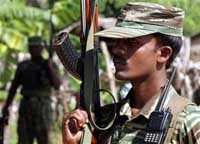Truce between Sri Lankan government and Tamil rebels must be re-examined
The Sri Lankan government wants to re-negotiate a cease-fire with the country's Tamil Tiger rebels, officials said adding that its air force had bombed a rebel military base and training camp in the country's war-torn north on Monday.

"There is no point in beating around the bush. Fact of the matter is that it (the agreement) has been violated over and over again," government spokesman Keheliya Rambukwella said. The government is prepared to take a fresh look at the cease-fire, he said, adding that it was up to the Norwegian sponsors to discuss the matter with the rebels.
His comments followed an earlier announcement that the Sri Lankan air force bombed a rebel military base and training camp in the rebel-held town of Mullaitivu in the north early Monday morning.
Military spokesman Brig. Prasad Samarasinghe gave no casualty figures but said "there were a large number of Liberation Tigers of Tamil Eelam cadres at the base when the strike occurred."
There was no immediate rebel response to the military statement.
Earlier, a statement from the European truce monitors in the country had said that the air force has increased airstrikes and spy plane activity over Tamil Tiger rebel-held areas in the north.
Combat seems to have "shifted from the east to the areas closer to Kilinochchi, the main rebel-held town in the north," The Sri Lanka Monitoring Mission said in its weekly media statement.
The government spokesman reacted angrily to the mission's statement, saying that it had no mandate to comment on a matter of Sri Lankan national security.
"It is very clear that SLMM has no mandate. It is purely the Sri Lankan government who will be responsible ... who will act on the basis of sovereignty and national security with regard to the matters relating to sea and air (security)," Rambukwella added.
The SLMM in its weekly statement had said that there were up to eight air strikes in northern rebel-held areas in the week of April 23-29.
It said the number of unmanned aircraft and spy planes flying over the north had also increased.
In 2002, Norway brokered a government-rebel truce that officially remains in place, although the fighting has worsened. Both sides insist they respect the cease-fire, and are only fighting in response to the other's aggression.
The government has already ousted insurgents from bases in eastern Sri Lanka, and officials say they plan to make a push soon into the rebels' heartland in the north, where they run a mini-state complete with border guards, schools and traffic police.
In intense fighting last week, at least 32 rebels and four government soldiers were killed in a series of gunbattles, a naval battle and a land mine blast.
The Tamil Tigers have fought government troops since 1983 for an independent homeland in the north and east for Sri Lanka's minority ethnic Tamils after decades of discrimination by the majority Sinhalese.
The conflict killed at least 65,000 people before the 2002 cease-fire. Air raids, bus bombings, suicide attacks and jungle clashes have left an estimated 4,000 more dead since December 2005.
Subscribe to Pravda.Ru Telegram channel, Facebook, RSS!




